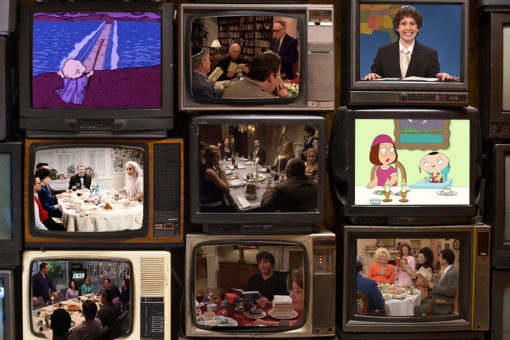Almost a week before the original release date of the highly anticipated Gaslighter, the first new music by the Dixie Chicks in 14 years and the band’s first collaboration with pop-bop producer Jack Antonoff, the group announced that the album would be delayed indefinitely due to the coronavirus pandemic. As a long-time fan of the band, I was devastated. Some of my fondest high school memories were of belting “COWBOY TAKE ME AWWWAAAYYY” while driving home from cross country practices with friends — as if we knew what that meant. Even today, I continue to model my life decisions on their 2006 song “Taking the Long Way Around.” I’m not sure I recommend that level of devotion.
Despite my initial heartbreak at having to wait even longer for new music from one of my favorite bands, the pause on the release, and subsequent reflection, turned out to be exactly what they, and I, needed; it was beshert. It was during this time that the country began to reckon with symbols of hate ingrained in American culture, including the history of the term “Dixie.” The name derives from the term “Mason-Dixon Line,” after the names of the surveyors who settled a border dispute between Pennsylvania and Maryland in 1767. However, the Missouri Compromise of 1820 used the border, and coined the term “Mason-Dixon” as the demarcation between the free North and the slave-holding South. Amid these public discussions, the band decided to drop the first half of their moniker and go by The Chicks. A more comprehensive discussion of the term can be found here, but the conclusion is simple: The term is nostalgic slang for a disgraceful time in southern history and the group was right to change it.
The Chicks revealed the new name together with a new single off Gaslighter, “March, March.” Never ones to mince words, the lyrics are some of their most pointed yet — “Print yourself a weapon and take it to the gun range/(Ah, cut the shit)/(You ain’t goin’ to the gun range)” — but the music is merely the percussive undertone to the powerful video it was unveiled with.
The video comprises scenes from the current Black Lives Matter protests cut back and forth with historic protests, and videos of police in modern riot gear meld with Civil Rights Era black-and-white footage of police beating protesters with batons. The most powerful and haunting aspect is that nearly half of the four-minute long video consists only of the flashing of individual names that increase in speed to Emily Strayer’s banjo and Martie Maguire’s violin. Those names, “George Floyd, Breonna Taylor, Michael Lorenzo Dean, Tony McDade, Rayshard Brooks…” belong to Black men and women recently killed by police. It is a deeply moving and jarring tribute to see the sheer number of names, of lives, senselessly lost to violent, systemic racism.
As I wait for the rest of the album to drop, which is now officially set for July 17, I’ve been thinking about my own affinity for the flaxen-haired trio. Of course I loved the toe-tapping tunes and rebellious “girl power” vibes, but so much more resonated with me personally as a Jew growing up in the Bible Belt. The Chicks’ music continues to sit with me, even now that I live in New York City, surrounded by like-minded and like-practicing people. Their music empowers me to feel like I belong in both places.
The stereotypical Jewish character featured in a TV show or movie — the one with the loud Jewish (read: New York) accent — never resonated with me or my family’s experience. I went to fiddle camp (an Irish and American fiddle music intensive on my violin teacher’s farm), not sleepaway camp. We put out our white table cloth and drank sweet tea out of the good china on Shabbat, and after throwing bread into the lake in our backyard for tashlich on Rosh Hashanah, we would pull out a fishing rod and throw a few casts, just like my father did, and my father’s father. L’dor v’dor, y’all!
It never occurred to me that our family was different from any other Jewish family until moving to New York. Heck, I didn’t even realize that my parents had a southern accent until moving away, but why wouldn’t they? My parents and grandparents are native Floridians. I like to imagine that my great-great grandparents, who escaped the pogroms of Eastern Europe in the 1880s and moved directly to Key West (talk about a schlep!), adopted a twang when they learned English.
Like every other progressive feminist of the oughts from the South, I loved the sound and the rebellion of The Chicks. Despite the fact that overt proclamations of Christianity are a hallmark of country music, I could comfortably consume them.
Aside from not really wanting to sing about Jesus taking the wheel while riding shotgun with my hair undone in the front seat of my friend’s car, the content of country songs about fearing God or proclaiming sins made me uncomfortable, because they were antithetical to the values of my Reform Jewish upbringing.
Not The Chicks.
Their music is markedly void of religiosity; well, except to subvert it. In “Sin Wagon,” the song’s barn raising violin and banjo are overlaid on a traditional gospel hymn. The lyrics are about breaking free from an ex-boyfriend and finally having fun drinking and “Feel[ing] like Delilah lookin’ for Samson; Do a little mattress dancin’.” That’s right, she said “mattress dancin’.” Sure, in 2020 a radio station wouldn’t bat an eyelash about playing this song, but in 1999 (and in 2007 when I was old enough to discover it), it was risqué and revolutionary for women to be singing so sex-positively.
The top selling all-women band broke records and collected over a dozen Grammys with a myriad of non-traditional country songs about everything from murdering an abusive husband (“Goodbye Earl”) to the fading memory of the Vietnam War (“Travelin’ Soldier”) and the rejection of traditional gender roles and the pressure to get married (“Ready to Run”; the entirety of Fly, etc.). They were “On Top of the World,” until they weren’t.
The Chicks’ best known ballad is “Not Ready to Make Nice,” which was a response to the backlash and boycotts the band received after lead singer Natalie Maines exclaimed on stage at a concert in the UK, “[W]e’re ashamed that the President of the United States is from Texas,” in opposition of the Iraq War in 2003. To me, the song is as resonant and defiant today as it was 15 years ago.
Every time I hear this song I am inspired by the power of these women who, at great personal and professional costs, outright refused to apologize for who they are and what they believe in. This song is a reminder that there are just some things we never need to be sorry for.
Just as their lyrics champion going against the grain, The Chicks’ sound is unapologetically, almost traditionally, Southern.
Their music paints a familiar picture of dirt roads and lines of pine trees, quiet on a still summer evening. Sans vocals, Strayer and Maguire, on banjo and fiddle, plant the group’s genre squarely in country. Now that I live in New York, and desperately long for “Wide Open Spaces” and a decent slice of key lime pie, the band’s music is a balm for the homesickness and as comforting as “a pillow of blue-bonnets and a blanket made of stars.”
The Chicks’ whole vibe has always been that you can be a little different and stick your neck out for what you believe in, yet still belong in and love the home that raised you — even if it is a work in progress. That message was never more emblematic than in that famous remark about former President Bush. Maines said that they were ashamed he was from Texas, not that they were ashamed to be from the state.
That statement speaks to me now more than ever. Between the latest “Florida Man” joke to hit the internet, and our Governor’s pitiful response to the pandemic and racial justice, it is easy for people outside of the state to write it off as a backwards monolith. But I am proud of the work that activists in my town have done for years, and I’m proud of the city commission’s vote to remove a Confederate statue in the square. I’m proud of the state for electing the first woman Agriculture Commissioner, who happens to be Jewish, and has been the authoritative voice for accurate information about the coronavirus to Floridians and has protested police brutality.
As a Jew from the South, I didn’t always feel like I belonged back home. Now that I live in New York City, I feel more like I belong, but less like I’m home. The Chicks remind me to forge ahead and embrace all parts of my identity, no matter where I am.
If their new song is any indication, The Chicks are back and better than ever.
Header Image design by Grace Yagel. Photo by Gary Miller/FilmMagic via Getty Images.



